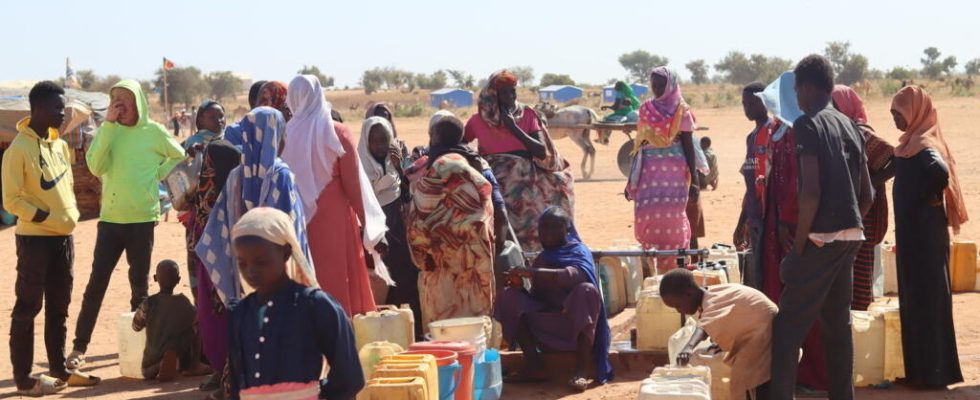The war in Sudan broke out on April 15, 2023 between forces loyal to army chief Abdel Fattah al-Burhan and those of Mohamed Hamdane Dogolo “Hemedti”, his former deputy and commander of the rapid support paramilitary forces. The Sudanese have had to learn to deal with this new tragedy, after 12 months of violent fighting, war crimes, thousands of victims and millions of displaced people. RFI returns to the situation in this East African country, through its special edition, this Monday from 6:30 a.m. to 7:30 a.m. UT.
A year ago, the Sudan was ignited. The conflict was triggered when the country had been in a climate of high tension for months. The economic situation was disastrous and demonstrations were daily for the return of civilians to power.
Indeed, the military had taken control of the state and the rivalry continued to rise between Abdel Fatah al-Burhan, head of the army, and Hemedti, leader of the paramilitary Rapid Support Forces (FSR), transforming the country in powder magazine. The first, who was then president, also brought back to the affairs of the Islamists of the time of the former dictator Omar al-Bashir, which the second interpreted as a desire to establish his domination.
At the same time, both camps recruited, particularly in Darfur, among Arab tribes on the FSR side, among non-Arabs on the army side.
Added to this was a political standoff since there were very sensitive negotiations to integrate the FSR into the army. An unbearable idea for their leader, since Hemedti drew his influence, his power, his wealth from his paramilitary organization.
Both sides began to dangerously deploy their men. With finally a conflagration on April 15, 2023, when the RSF launched a series of attacks in Khartoum, targeting military bases, the airport and even the presidential palace. The war had just started.
Twelve months later, this conflict has left thousands dead and caused a humanitarian catastrophe. It forced around 1.8 million people to leave the country and caused at least 6.7 million internal displacements.
RFI returns this April 15, 2024, from 6:30 a.m. to 7:30 a.m. UT, on this tragic year for this East African country of 48 million inhabitants through its special edition, “Sudan: after a year of war, living despite everything”, presented by Nathalie Amar and coordinated by Laurent Correau And Alexandra Brangeonwith the participation of:
– Jerome Tubianaadvisor to the NGO Médecins sans frontières (MSF) on refugee issues and specialist in Souda
– Sébastien Nemethjournalist in the Africa department of RFI
– Carol ValadeRFI correspondent in Chad
It is also in this context that the humanitarian conference for Sudan is being held on Monday in Paris. Around twenty ministers are expected: representatives of Sudan’s neighboring states, the Gulf, the European Union, the United Nations and international and regional organizations. However, no representative of the belligerents will be present. In a period marked by the multiplication of conflicts, this day must help put the Sudanese war at the center of international attention. An intense day which will take place in three parts.
Objective of this ministerial meeting: adopt a joint declaration of principle and take stock of the various ongoing peace initiatives. However, the planned format should not allow going into detail about the positions of the belligerents, indicates a diplomatic source. The idea being, according to this same source, to find the means to make the action of the international community ” more efficient “. And particularly in the negotiation of humanitarian access.
► Our file Sudan to read here
At the same time, around forty actors from Sudanese civil society will meet at the Arab World Institute: politicians, but also trade unionists, researchers and businessmen, are announced. It is a question of offering a space for discussion to civil actors dispersed by the conflict and called to participate in a possible political transition.
Last part: that of the humanitarian conference to try to mobilize the various donors. Only 5% of the UN Appeal was funded this year. However, the needs are colossal: more than 4 billion dollars to provide logistical support and food in this country where almost half of the population is in a situation of acute food insecurity.
Because there is an emergency, explains Sophia Sprechmann Sineiro, International Secretary of the NGO Care international at the microphone of Sébastien Nemeth, there is risk of famine in Sudan. “ The Sudanese cannot wait any longer! The time for action is now. The conference must be a turning point in the international response, to propose concrete and immediate solutions against this tragedy… It is an opportunity to reverse the trend, and world leaders must obtain and maintain a ceasefire. One more month of violence, of brutality, would be unbearable… We are also waiting for greater and more flexible aid funding. And these funds must go to all humanitarian actors, to cover months and years of work. »
She continues: “ But I insist on the importance of local actors. They know the communities, the terrain. They can reach populations inaccessible to international NGOs. Their role must be recognized through commensurate investments and partnerships… Finally, we need better access to the populations, with more constant and better coordinated diplomatic pressure on the belligerents. By using all ports, without bureaucratic blockages, it is absolutely vital… The horrors that civilians are suffering are unimaginable. Paris cannot be a meeting made of empty promises in the face of this terrible crisis.”
Read alsoIn Sudan, the economy devastated by a year of conflict
Last Friday, the Sudanese Ministry of Foreign Affairs declared itself “ unworthy » of the holding of this international humanitarian conference for Sudan, denouncing in a press release an attack on the “ sovereignty ” from the country.
